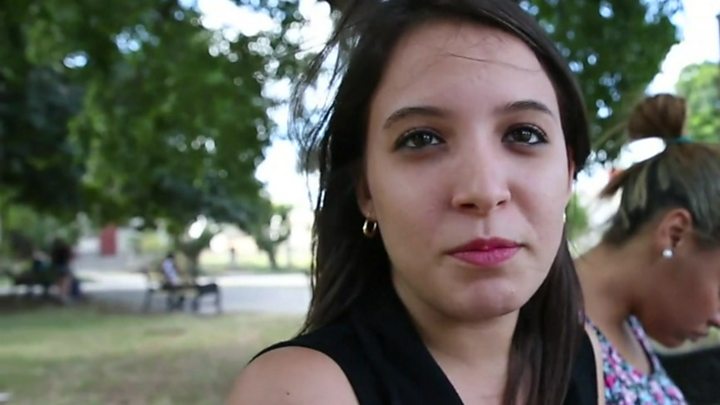Media playback is unsupported on your device
The US has announced a new ban on travel to Cuba for American group tours as well as cruise ships journeying to the island.
The move, which was announced by Trump administration officials, intends to roll back a US-Cuba thaw that began under President Barack Obama.
It is unclear exactly how the rules, which take effect on Wednesday, will impact travel to the island nation.
US officials say the new rules seek to punish the country's communist regime.
US Treasury Secretary Steven Mnuchin said in a statement on Tuesday the measures come in response to Cuban efforts "to play a destabilising role in the Western Hemisphere, providing a communist foothold in the region and propping up US adversaries in places like Venezuela and Nicaragua by fomenting instability, undermining the rule of law, and suppressing democratic processes".
"This administration has made a strategic decision to reverse the loosening of sanctions and other restrictions on the Cuban regime," Mr Mnuchin said.
"These actions will help to keep US dollars out of the hands of Cuban military, intelligence, and security services."
US tourism to Cuba is not permitted, but certain forms of organised group travel, known as "people-to-people" travel, had been allowed until Tuesday's announcement.
Commercial travel can continue, as long as the trips "broadly support family travel and other lawful forms of travel", a US State Department spokesperson added, but other vessels such as private yachts or planes are banned.
Cruise ship companies have not yet reacted to the news, but Norwegian Cruise Lines tweeted to one concerned customer: "We are closely monitoring these recent developments and any resulting impact to cruise travel to Cuba.
"We will communicate to our guests and travel partners as additional information becomes available."
Cuban government statistics show that Americans have become the second largest group of visitors to the island, after Canadians – with more arriving by ship than plane.
Americans who have already booked "at least one travel related transaction" – such as purchasing a flight – will still be allowed to continue their travel, US officials say.
White House national security adviser John Bolton outlined plans for sanctions earlier this year, referring to Cuba, Venezuela and Nicaragua as a "troika of tyranny".
In a tweet on Tuesday, he said the new rule means "ending 'veiled tourism' to Cuba".
Skip Twitter post by @AmbJohnBolton
The Administration has advanced the Presidents Cuba policy by ending veiled tourism to Cuba and imposing restrictions on vessels. We will continue to take actions to restrict the Cuban regimes access to U.S. dollars. https://t.co/uwxd5qktKY
— John Bolton (@AmbJohnBolton) June 4, 2019
End of Twitter post by @AmbJohnBolton
In a statement, US Commerce Secretary Wilbur Ross added: "Cuba remains communist, and the United States, under the previous administration, made too many concessions to one of our historically most aggressive adversaries."

Media playback is unsupported on your device
Cuban Minister of Foreign Affairs Bruno Rodríguez Parrilla, who tRead More – Source
Media playback is unsupported on your device
The US has announced a new ban on travel to Cuba for American group tours as well as cruise ships journeying to the island.
The move, which was announced by Trump administration officials, intends to roll back a US-Cuba thaw that began under President Barack Obama.
It is unclear exactly how the rules, which take effect on Wednesday, will impact travel to the island nation.
US officials say the new rules seek to punish the country's communist regime.
US Treasury Secretary Steven Mnuchin said in a statement on Tuesday the measures come in response to Cuban efforts "to play a destabilising role in the Western Hemisphere, providing a communist foothold in the region and propping up US adversaries in places like Venezuela and Nicaragua by fomenting instability, undermining the rule of law, and suppressing democratic processes".
"This administration has made a strategic decision to reverse the loosening of sanctions and other restrictions on the Cuban regime," Mr Mnuchin said.
"These actions will help to keep US dollars out of the hands of Cuban military, intelligence, and security services."
US tourism to Cuba is not permitted, but certain forms of organised group travel, known as "people-to-people" travel, had been allowed until Tuesday's announcement.
Commercial travel can continue, as long as the trips "broadly support family travel and other lawful forms of travel", a US State Department spokesperson added, but other vessels such as private yachts or planes are banned.
Cruise ship companies have not yet reacted to the news, but Norwegian Cruise Lines tweeted to one concerned customer: "We are closely monitoring these recent developments and any resulting impact to cruise travel to Cuba.
"We will communicate to our guests and travel partners as additional information becomes available."
Cuban government statistics show that Americans have become the second largest group of visitors to the island, after Canadians – with more arriving by ship than plane.
Americans who have already booked "at least one travel related transaction" – such as purchasing a flight – will still be allowed to continue their travel, US officials say.
White House national security adviser John Bolton outlined plans for sanctions earlier this year, referring to Cuba, Venezuela and Nicaragua as a "troika of tyranny".
In a tweet on Tuesday, he said the new rule means "ending 'veiled tourism' to Cuba".
Skip Twitter post by @AmbJohnBolton
The Administration has advanced the Presidents Cuba policy by ending veiled tourism to Cuba and imposing restrictions on vessels. We will continue to take actions to restrict the Cuban regimes access to U.S. dollars. https://t.co/uwxd5qktKY
— John Bolton (@AmbJohnBolton) June 4, 2019
End of Twitter post by @AmbJohnBolton
In a statement, US Commerce Secretary Wilbur Ross added: "Cuba remains communist, and the United States, under the previous administration, made too many concessions to one of our historically most aggressive adversaries."

Media playback is unsupported on your device
Cuban Minister of Foreign Affairs Bruno Rodríguez Parrilla, who tRead More – Source











